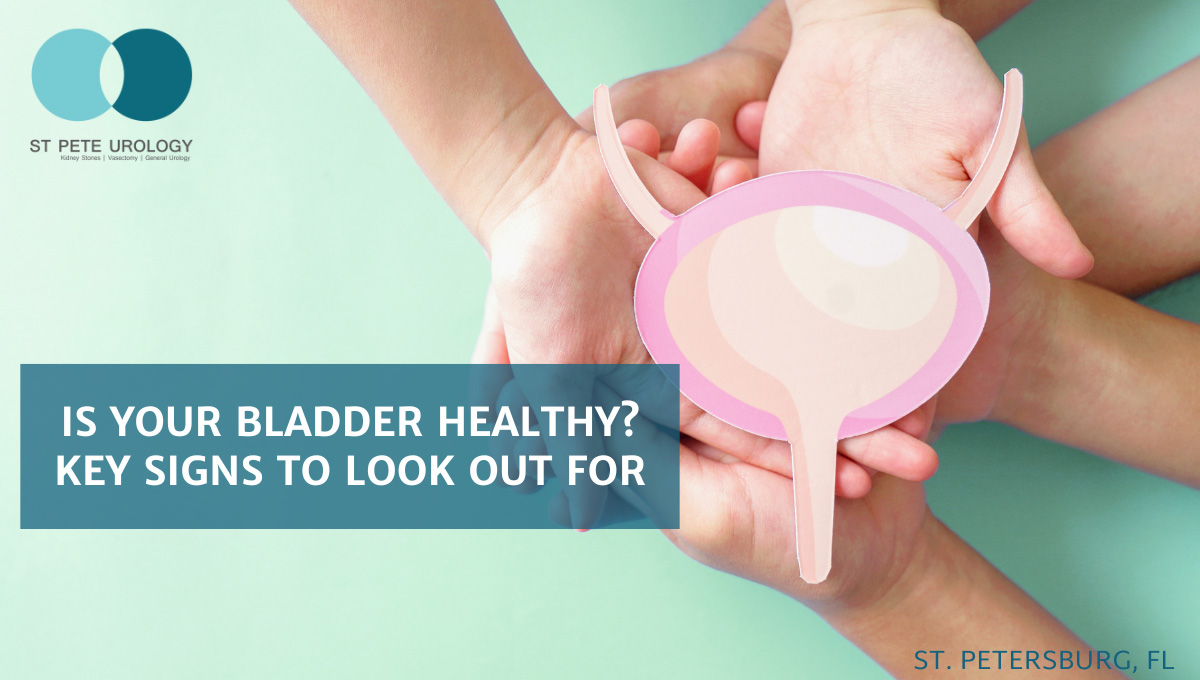Discover why you keep getting UTIs and learn evidence-based prevention strategies from board-certified urologists at St Pete Urology in St. Petersburg, FL.
Continue readingHow Can Women Prevent Recurrent UTIs?
Prevent recurrent UTIs in women with proven methods—hydration, hygiene, vaginal estrogen, probiotics & more. Expert advice from St Pete Urology.
Continue readingWhy Are UTIs More Common in Women?
Discover why UTIs are more common in women and learn effective strategies to prevent them. Stay informed and protect your urinary health.
Continue readingUnderstanding and Managing Urinary Tract Infections in the Elderly
Effectively managing urinary tract infections in the elderly is crucial for their well-being. Learn more about UTIs here at St Pete Urology.
Continue readingIs Your Bladder Healthy? Key Signs to Look Out For
Recognizing the key signs of a healthy bladder is important to monitor its condition and seek medical advice when necessary.
Continue readingAre UTIs Common and How Can They Be Effectively Treated?
Key Takeaways:
- Urinary tract infections (UTIs) are common and can affect people of any age, but women, especially those in their child-bearing years, are more commonly affected.
- Symptoms of UTIs include a strong urge to urinate, burning sensation during urination, cloudy or strong-smelling urine, and pelvic or rectal pain.
- Prevention of UTIs is possible through good hygiene practices, lifestyle changes, and in some cases, medical interventions.
With a welcoming tone, allow me to inform you about urinary tract infections (UTIs), a common but often misunderstood health issue. UTI, as defined by urologists, occur when your urinary system is invaded by bacteria or other microbes. This results in a range of symptoms like a persistent urge to urinate, burning sensation during urination, cloudy urine, or even lower abdominal pain. The importance of effective treatment, my friend, cannot be overemphasized.
Prevalence of UTIs

Turning to the question of ‘Are UTIs common?’, statistics show that roughly 150 million people worldwide experience UTIs every year. Women, especially those in their child-bearing years, are more commonly affected, but UTIs can strike anyone. Certain risk factors increase your chances, such as sexual activity, certain types of birth control, menopause, and conditions like diabetes.
Causes and Types of UTIs
UTIs are primarily caused by bacterial infections, often due to improper hygiene practices. They’re categorized into two types: lower UTIs (affecting the urethra and bladder) and upper UTIs (impacting the ureters and kidneys). Other contributing factors may include a weakened immune system or abnormalities in the urinary tract.
Symptoms and Diagnosis
Regarding symptoms and diagnosis, timing is critical. Classic UTI symptoms include a strong urge to urinate, burning sensation during urination, cloudy or strong-smelling urine, pelvic pain in women, and rectal pain in men. Medical professionals typically conduct a urinalysis or urine culture to diagnose UTI.
Treatment Options
The primary treatment for bacterial UTIs is antibiotics. It is crucial to complete the entire course of antibiotics, even if symptoms dissipate before the medicine is finished, in order to prevent UTI recurrence. If antibiotics are not an option, other treatments may include natural remedies and pain management.
Prevention of UTIs
Thankfully, prevention of UTI is possible. Good hygiene practices play a significant role, such as wiping from front to back, urinating after intercourse or regularly throughout the day, and avoiding products that irritate the urethra. Lifestyle changes can also reduce the risk of UTI, with actions like staying well hydrated, avoiding constipation, and considering alternative birth control methods. In some cases, medical interventions, such as a low-dose antibiotic course or non-antibiotic prophylaxis, are beneficial.
Potential Complications
Remember, untreated UTI can have severe complications. Recurring UTIs may cause kidney disorders or pregnancy complications, while untreated UTIs can lead to life-threatening kidney infections.
Conclusion
In conclusion, UTIs are indeed ubiquitous but with effective treatment, they’re manageable. The crucial points to remember are recognizing symptoms promptly, seeking immediate medical advice, adhering to prescribed treatments, and maintaining good hygiene.
Exert yourself to adopt preventive measures. If you live in or around St Petersburg, Florida, choose St Pete Urology, the professionals dedicated to your urological health. Entrust your care to expert urologists in FL who prioritize cutting-edge treatment, prevention, and early diagnosis of conditions such as UTIs. Their passion lies in ensuring your health, comfort, and well-being. Let’s tackle UTI head-on, and manage them greatly. You are not alone in this. We are here, because you matter.
References:
- St Pete Urology. (2011, November 4). Recurring Urinary Tract Infections. St Pete Urology. https://stpeteurology.com/recurring-urinary-tract-infections/
- St Pete Urology. (2019, July 8). St. Pete Urology | Urologists in St Petersburg, Florida. St Pete Urology. https://stpeteurology.com/why-do-i-keep-getting-utis/
- CDC. (2022, January 14). Urinary Tract Infection. Centers for Disease Control and Prevention. https://www.cdc.gov/antibiotic-use/uti.html
- Jancel, T., & Dudas, V. (2002). Management of uncomplicated urinary tract infections. Wjm, 176(1), 51–55. https://doi.org/10.1136/ewjm.176.1.51
- And, D. (2023, August 28). Bladder Infection (Urinary Tract Infection—UTI) in Adults – NIDDK. National Institute of Diabetes and Digestive and Kidney Diseases. https://www.niddk.nih.gov/health-information/urologic-diseases/bladder-infection-uti-in-adults
The Role of Diet in UTI Prevention and Treatment
3 Key Takeaways:
- Diet can play a role in UTI prevention and treatment by reducing exposure to UTI-causing bacteria, changing the pH of urine, flushing out bacteria, preventing bacteria from attaching to cells, and adding good bacteria to the urinary tract.
- Eating a vegetarian diet, drinking plenty of fluids, eating foods rich in vitamin C, and eating berries can help protect against UTIs.
- Avoiding sugary foods, bladder irritants, acidic fruits, and animal meats can reduce the risk of UTIs and improve recovery.
Do you already have a urinary tract infection (UTI)?
 If so, you need immediate antibiotic treatment—UTIs respond well to antibiotics. But if your UTI is a stubborn or recurrent illness, then you should try a dietary change alongside the antibiotics. There are foods that can protect your urinary tract by increasing the pH of the tract, stopping the growth of bacteria, or preventing bacterial attachment on cells. In turn, they improve the efficiency of antibiotics and speed up recovery. So, what is the role of diet in UTI prevention and treatment?
If so, you need immediate antibiotic treatment—UTIs respond well to antibiotics. But if your UTI is a stubborn or recurrent illness, then you should try a dietary change alongside the antibiotics. There are foods that can protect your urinary tract by increasing the pH of the tract, stopping the growth of bacteria, or preventing bacterial attachment on cells. In turn, they improve the efficiency of antibiotics and speed up recovery. So, what is the role of diet in UTI prevention and treatment?
Can reduce exposure to UTI-causing bacteria
Some foods are reservoirs of UTI-causing bacteria while others are not. For example, pork, poultry, and other types of animal meat are reservoirs of the bacterial strains of Escherichia coli (E. coli) called extra-intestinal pathogenic E. coli (ExPEC). ExPEC are known to be responsible for over 70 percent of all UTIs. Therefore, when you regularly eat foods that contain ExPEC, you increase your risk of UTIs. On the contrary, plant-based foods do not often contain these bacteria. Hence, a vegetarian diet helps you avoid contact with these bacteria and protects you against new or recurrent UTIs.
Can change the pH of the urinary tract
For you to have a UTI, bacteria from the outside or from another part of the body must reach and establish in the urinary tract. But the growth of bacteria in the tract requires a suitable pH, among other factors. Studies have shown that foods that increase the pH of urine tend to stop the growth of UTI-causing bacteria. In contrast, foods that make the urine more acidic promote the growth of these bacteria and increase the frequency of UTIs.
This is how: Studies have shown that red meat and other animal proteins contain high potential renal acid loads (PRALs). When these foods are eaten frequently, they increase the acidity of urine and encourage the growth of UTI-causing bacteria. But fruits and vegetables contain low potential renal acid loads (PRALs). So, a regular vegetarian diet makes urine less acidic, prevents the growth of bacteria, and protects against UTIs. To prevent UTI, regularly eat oranges, broccoli, tomatoes, spinach, red berries, cauliflower, grapefruits, and foods rich in vitamin C.
Can flush out bacteria from the urinary tract
Water and other fluids are powerful antidotes against UTIs. Drinking plenty of fluids, even when not thirsty, increases urinary frequency. During urination, the urine stream washes out bacteria from the urinary tract. This reduces their numbers and protects against infection. In fact, studies have shown that taking 6-8 glasses of water every day reduces the risk of UTIs by 58 percent. It also speeds up recovery from UTIs and protects against recurrent infections.
Can prevent bacteria from attaching to cells of the urinary tract
Some foods play a role in UTI prevention and treatment by stopping infectious bacteria from attaching to the walls of the urinary tract. For example, freshly-squeezed 100-percent berry juices, like cranberry and blueberry, make it impossible for Escherichia coli and other bacteria to attach to cells of the urinary tract. These berries contain compounds called proanthocyanidins, which prevent the bacteria from sticking to the lining of the urinary tract. Hence, the bacteria remain free in the tract and are easily flushed out by urine. So, by adding these berries to your diet, you lower your risk of infection, speed up your recovery from an existing UTI, and prevent recurrent infections.
Can add good bacteria to the urinary tract
UTIs can be prevented by biological means. And probiotics and fermented foods are a great way to use good bacteria to stop the growth of bad bacteria in the urinary tract. For instance, yogurt and other fermented foods, such as sauerkraut and pickles, contain Lactobacilli and Bifidobacteria. When these bacteria reach the urinary tract, they stop Escherichia coli and other infectious bacteria from growing. By enriching your diet with probiotics and fermented products, you can prevent UTIs by stopping the growth of infectious bacteria.
Can make the urinary tract favorable for growth of UTI-causing bacteria
There are certain foods that encourage the growth of Escherichia coli and other UTI-causing bacteria. And so their intake should be reduced when undergoing treatment for UTIs. For instance, taking too much sugar encourages the breeding of bacteria in the urinary tract. That’s why you need to reduce sugar consumption when undergoing treatment or avoid sugar when struggling with a recurrent UTI. Also avoid sugary cookies, candies, or sweetened beverages—substitute them with water. Likewise, potential bladder irritants should be avoided. Once they irritate the bladder, they increase lower urinary symptoms that end up creating conditions necessary for the growth of infectious bacteria. Therefore, when undergoing treatment for UTI, avoid bladder irritants such as tea, soda, alcohol, coffee, and artificially sweetened beverages. Equally, avoid spicy foods and stop eating acidic fruits, such as lemons, oranges, or limes. You can resume eating them after the infection is gone, especially to get vitamin C, which helps prevent future infections.
Want to learn more about UTIs and other urological problems? Visit the site “St Pete Urology.”
References
- “Urinary Tract Infection.” Mayo Clinic, www.mayoclinic.org/diseases-conditions/urinary-tract-infection/symptoms-causes/syc-20353447.
- “Urinary Tract Infections.” UCSF Health, www.ucsfhealth.org/en/conditions/urinary-tract-infections.
- “Urinary Tract Infection.” Mayo Clinic, www.mayoclinic.org/diseases-conditions/urinary-tract-infection/diagnosis-treatment/drc-20353453
“How to Prevent UTI.” Healthline, https://www.healthline.com/health/how-to-prevent-uti.
Why do I get recurring urinary tract infections?
 You can contract a urinary tract infection (UTI) at any point in your life. A urinary tract infection refers to entry of bacteria into the urinary tract via the urethra and then the subsequent multiplication and spreading to the urinary system, which leads to illness. The three most common UTIs are cystitis, urethritis, and pyelonephritis.
You can contract a urinary tract infection (UTI) at any point in your life. A urinary tract infection refers to entry of bacteria into the urinary tract via the urethra and then the subsequent multiplication and spreading to the urinary system, which leads to illness. The three most common UTIs are cystitis, urethritis, and pyelonephritis.
Urethritis is an infection of the urethra. It occurs when bacteria reaches the urethra and multiply there without progressing to deeper parts of the urinary tract. Cystitis is an infection of the bladder, which results when bacteria enter via the urethra and move into the bladder where it multiplies and causes disease.
Pyelonephritis is an infection of the kidney. It is triggered by the backward flow of infected urine from the bladder into the kidneys. But it can also be due to an infection in the bloodstream that ultimately reaches the kidneys.
Most urinary tract infections resolve without treatment. However, a number of them require antibiotic treatment. When a urinary tract infection reappears 2 or more times within 6 months, it is said to be recurrent. A recurrent UTI may also be an infection that occurs at least 3 times per year. Failure to promptly and decisively treat recurrent UTIs can lead to kidney damage.
What are the causes of recurrent urinary tract infections?
- Underlying health issues
The risk of recurrent urinary tract infections increases with certain health conditions. For instance, you’re likely to have recurrent UTI if you have suppressed immunity, certain autoimmune diseases, neurological disorders, urinary stones, an enlarged prostate, or a chronic health condition like diabetes.
Also, you are more susceptible to recurrent UTI if you have had surgery on any part of your urinary tract, which produces scar tissue or an alteration in anatomy. Having a catheter and going through menopause also increase the risk of recurrent UTIs.
- Genetics
The risk of recurrent UTIs is higher if you have cells that are naturally more receptive to bacteria. A number of studies have shown that due to genetics some people have cell receptors that favor bacteria causing UTIs. For such people, it is difficult to flush out these bacteria from the urinary tract, which in turn predisposes them to recurrent bladder and kidney infections.
- Sex
Women have a higher risk of recurrent urinary tract infections than men. That’s because women have a shorter urethra than men and therefore have the urethra located nearer the vaginal opening. More bacteria reach the urethra in women and are more likely to spread to the bladder and kidneys than in men.
- Poor bathroom habits
There are a large number of bacteria in feces. And when these bacteria in stool reach the urethra, they can cause urinary tract infections. That is why bathroom habits matter. And also why, after passing stool, women should wipe the anus from the front back to minimize the risk of fecal matter or bacteria moving from the anus into the urethra.
Also, bacterial transfer to the urethra increases in a dirty, moist environment. So it is important to be clean and dry before pulling your underwear back in place after peeing or passing stool. This prevents fecal matter from landing on the underwear and spreading when the underwear moves as you walk, sit or exercise.
- Sexual activity
Bacteria tend to spread easily during sexual activity. They can spread from your partner’s finger, tongue or genitals. They can also spread from sex toys. Plus, your own bacteria can spread from the vagina, penis or anus into the urethra. Likewise, items used during sex, such as spermicides, diaphragms and condoms increase the risk of recurrent UTIs.
Practicing good hygiene before and after sexual activity—such as cleaning sex toys before and after using them—can really minimize the risk of recurrent UTIs. Passing urine soon after sexual activity also helps to flush out errant bacteria. Speaking with your doctor about alternatives to spermicides and diaphragms can equally help with recurrent urinary tract infections.
What should you do to prevent recurrent urinary tract infections?
When struggling with recurrent UTIs, speak with your doctor about it. Apart from prescribing appropriate antibiotic treatment, the doctor may refer you to a urologist—a specialist in diseases and problems of the urinary system—to better pinpoint the cause and provide the most appropriate treatment.
Besides, you can take the following steps to prevent recurrent UTIs:
- Drinking plenty of water, advisably 8-10 glasses of water per day, to help you flush out bacteria from the urinary tract.
- Going to the bathroom as soon as you feel the urge to pee as holding urine can create a favorable environment for spread and multiplication of bacteria.
- Avoiding scented products, like sprays, douches, and powders that can irritate your urethra and predispose your urinary tract to infections.
- Emptying your bladder soon after sexual activity to help you flush out errant bacteria.
- Considering vaginal estrogen therapy after menopause to help keep healthy reproductive and urinary systems.
- Using alternative contraception that does not include spermicides, diaphragm or condoms.
- Proper wiping, particularly for women and girls, after using the toilet to reduce exposure of the urethra to UTI-causing bacteria found in poop.
Patient-friendly, compassionate treatment of urological disorders
Urinary problems can be both distressing and embarrassing. You may even find it difficult to speak about them. At St Pete Urology, we offer a pleasant, empathetic urological care to enable you to speak freely about your urinary tract infections and other urological disorders in order to ensure prompt, accurate diagnosis and treatment.
For more information on recurrent urinary tract infections and other urological disorders, visit the site “St Pete Urology.”
Does your diet affect UTI?
 Diet is generally critical in the prevention, treatment and recovery from urinary tract infections (UTIs). Some diets boost immunity and protect against UTIs while others reduce irritation in the urinary tract and hasten the healing process. Still some diets help to shed off bacteria and lower the risk of UTIs altogether.
Diet is generally critical in the prevention, treatment and recovery from urinary tract infections (UTIs). Some diets boost immunity and protect against UTIs while others reduce irritation in the urinary tract and hasten the healing process. Still some diets help to shed off bacteria and lower the risk of UTIs altogether.
So how does your diet affect UTI?
Plant-based diet
Studies have shown that plant-based diets lower the risk of developing urinary tract infections. In a 2020 study where 9,724 Buddhists were followed over a period of 9 years, it was reported that their vegetarian dietary pattern helped to lower their risk of UTIs by 16 percent.
But how does the vegetarian dietary pattern work? It works in two ways: by preventing bacterial growth and proliferation and by eliminating bacterial reservoirs.
Firstly, a vegetarian diet has low potential renal acid loads (PRALs). As a result, vegetables and fruits make urine less acidic and can prevent the growth of bacteria associated with UTIs.
On the contrary, red meat and other animal proteins have higher potential renal acid loads (PRALs). Therefore a regular diet rich in animal proteins leads to urine that is more acidic and that promotes urinary tract infections.
Secondly, a vegetarian diet pattern avoids foods that are reservoirs for the bacterial strains of E. coli called Extra-Intestinal Pathogenic E. coli (ExPEC). Since these bacteria account for 65-75 percent of urinary tract infections, eliminating their reservoirs prevents UTIs.
In contrast, animal meat, such as poultry and pork, are reservoirs of extra-intestinal pathogenic E. coli. And the frequent consumption of animal-based proteins increases the risk of UTIs.
Yogurt and other fermented products
Regular consumption of yogurt or other fermented dairy products reduces the risk of urinary tract infections by up to 80 percent. That’s because yogurt contains good bacteria, called live and active cultures.
When these bacteria reach your digestive and urinary tract, they crowd out and inhibit the growth of UTI-causing bacteria. The bacterial cultures in yogurt also boost immunity.
Fortunately, these bacteria are never killed by the freezing process. Instead, they only undergo a dormancy state. When eaten and restored to a warm temperature within the body, the bacteria become active and provide protection to the urinary tract.
Berries and fresh fruit juices
Frequent drinking of fresh berry juice lowers the risk of UTIs by up to 50-percent. Berries such as cranberries, raspberries, blueberries and other berries contain the phytochemical called pro-anthocyanidins, which reduces the ability of E. coli bacteria to adhere to the urinary tract walls.
Therefore, fresh berry juice makes it easier to flush out bacteria responsible for UTIs by destroying their capacity to adhere to the lining of the urinary tract. A great way of consuming large amounts of berries in your diet is through smoothies.
Foods rich in vitamin C
Foods rich in vitamin C, such as oranges, lemons, strawberries, and green leafy vegetables, help to change urine pH. The change in acidity of urine prevents bacteria from growing in urine. Vitamin C also boosts immunity and speeds healing.
Fiber-packed foods
Fiber is a critical stimulator of bowel movement. Hence, including bananas and other high-fiber foods in your diet can help you prevent UTIs by encouraging regular bowel movement and minimizing pressure on urine flow.
Increased hydration
Increased water and fluid intake is a dietary measure that prevents UTIs. In fact, drinking at least 8 glasses of water per day lowers the risk of UTIs by up to 40-percent. The high volume of water makes it more efficient to flush out bacteria from the urinary tract.
Cutting down on bladder irritants
Drinking cola soft drinks increases the risk of UTIs by at least 10-percent. According to a 1985 study that involved 225 women, beverages such as soda trigger or worsen urinary symptoms and in turn increase the risk of UTIs.
Like soda, bladder irritants, such as coffee, tea, alcohol, artificially sweetened drinks, and carbonated beverages amplify the risk of lower UT symptoms, such as urinary urgency and frequency, which increase the risk of urinary tract infections.
Timely, effective treatment of UTIs
Are you experiencing frequent urinary symptoms? Would you like a permanent solution to your recurrent urinary tract infection?
At St Pete Urology, we offer prompt, accurate diagnosis and treatment of UTIs. Our objective is to always provide proper treatment of UTIs to prevent serious complications, such as urosepsis and kidney damage, which are potentially life-threatening.
For more information on the diagnosis and treatment of urinary tract infections and other urological problems, visit the site “St Pete Urology.”
Why Do I Pee So Much
Key takeaways
- The frequency of peeing can be used to monitor overall health and anticipate certain problems. A regular peeing rate and volume occur when a person is well-hydrated and there is no undue pressure on the pelvic floor, bladder, and kidneys. A normal range is 5-8 voids in 24 hours and no more than twice at night if over 60 years old.
- Nocturia, or frequently peeing at night, can be caused by decreased production of anti-diuretic hormone (ADH) with age or a lack of production in children. It can also be caused by drinking too much water, taking diuretic medications, untreated diabetes, urinary tract infections, or an overactive bladder.
- It is important to speak with a medical professional if experiencing frequent or urgent peeing as it can be a symptom of underlying health issues.
 Peeing can be an inconvenience when it gets more frequent and urgent.
Peeing can be an inconvenience when it gets more frequent and urgent.
The good news is that you can use your frequency of peeing to monitor how your body works. You can use it to assess your overall health and anticipate certain problems.
What is considered normal when it comes to peeing?
A regular peeing rate and volume occur when you are well-hydrated. There is no undue pressure on your pelvic floor, bladder, and kidneys. It means that you can anticipate when and how frequently you visit the bathroom.
When healthy, a good peeing range is 5-8 voids in 24 hours. At night, you shouldn’t wake up more than twice to pee if you are over 60 years old. When you pee more than eight times in 24 hours, that could mean that you have an overactive bladder.
The amount of urine you pass depends on how much fluid you drink, how big your bladder is, and how much urine your body produces.
Your body makes roughly 3 liters of urine each day. If you have a normal, healthy bladder, you can hold 300-400 ml of urine (approximately 2 cups). The urge to pee should generally start when your bladder has 150ml of urine (just over half a cup).
What is nocturia?
Peeing frequently at night is called nocturia. It means you have to wake up more than once a night to go to the bathroom.
The body usually produces more anti-diuretic hormone (ADH) at night, which prevents your kidneys from filtering and releasing water until you wake up. With normal ADH, you shouldn’t have to struggle to hold urine through your sleep.
However, ADH production decreases with age. That is why older adults are at higher risk of nocturia than younger adults.
ADH takes more time to be produced in children. That is why children below six years tend to wear diapers at night because they can’t hold pee overnight.
What causes peeing too much?
- Drinking too much water
The more fluid you drink, the more urine you make, and the more frequently you need to pee. You can tell if you are drinking enough by checking the color of your urine. If your pee is light yellow to clear, then you’re taking in enough fluid.
But if your pee is always clear and you spend a lot longer in the bathroom, then you are probably drinking too much. Though drinking too much fluid isn’t dangerous, you can ease the amount to reduce your visits to the toilet.
- Accidental or therapeutic use of diuretics
Diuretic medications help your body to get rid of excess fluid. The drugs work by prompting the kidney to be more permeable to sodium. This allows more sodium in the urine, which draws more water out of the blood into urine, lowering your blood pressure.
Diuretics are used as medications for high blood pressure. You should expect to pass urine a lot more when on these medications.
Drinks such as coffee, tea, and soda can act as diuretics, increasing your peeing frequency.
- Untreated diabetes
Untreated diabetes means a continually high level of glucose in your blood. Since your kidneys can’t handle the re-absorption of this extra glucose, it is excreted in the urine.
The presence of glucose in your urine draws additional fluids along with the glucose, resulting in an increased peeing rate. And as you lose more fluids, your body becomes dehydrated, and you feel thirstier than usual. You will end up drinking and peeing a lot more.
- Urinary tract infections
Urinary tract infections occur when bacteria enter via the urethra and multiply anywhere in your urinary tract. As the bacteria multiply, usually in the bladder, inflammation, and irritation increase the urge to pee.
In some cases, the bladder can become inflamed without an infection. This type of inflammation results in a chronic condition called interstitial cystitis or painful bladder syndrome, which is more common in women.
- Overactive bladder
Characterized by a sudden urge to pee that you can’t control, an overactive bladder occurs when signals from the brain fail, causing bladder muscles to want to squeeze out urine when it isn’t full.
This condition is an urge-related form of urinary incontinence, wherein suddenly you feel the need to pee, but not much comes out.
Overactive bladder is more common in people with neurological disorders, such as multiple sclerosis, stroke, Parkinson’s disease, dementia, or a bladder abnormality like bladder tumor.
These diseases tend to cause damage to the nerves that tell the bladder muscles when to contract.
- Urinary incontinence
Urinary incontinence is a condition where muscles that close off the urethra become weak, causing stress-inducing urinary leakage. The leaks may occur when you’re sneezing, coughing, or during strenuous exercise.
Incontinence may be due to pregnancy and childbirth, which weaken pelvic floor muscles.
Additionally, lower estrogen levels after menopause can also cause tissues to deteriorate in the urinary tract, resulting in incontinence.
- An enlarged prostate
For men with an enlarged prostate, there may be a constant feeling of needing to pee.
The growing prostate puts pressure on the urethra. It blocks the flow of urine, making the bladder work harder to expel the urine. The leftover urine can become a breeding ground for bacteria and lead to inflammation, further messing with the bladder.
- Pregnancy
When pregnant, blood volume increases, and the kidneys have to work through the excess fluid. This means that more fluid ends up in the bladder, and you can pee too much.
Increased frequency of peeing starts in the first trimester and gets worse in the subsequent trimesters.
What are the solutions to frequent peeing?
Frequent peeing can be reduced by cutting out bladder irritants from the diet. You can do so by avoiding alcohol, caffeine, artificial sweeteners, citrus, and spicy foods.
You should also quit smoking and lose weight. And drink most of your fluids earlier in the day to avoid trouble at night.
Peeing too much can be treated using medications. You can take medications that relax the bladder and its nearby muscles, such as antidepressants imipramine (Tofranil) and duloxetine (Cymbalta).
You can also get a Botox injection into your bladder. This will give temporary relief by paralyzing the muscles and blocking the chemical messenger acetylcholine, which sends signals to your brain to trigger abnormal bladder contractions associated with an overactive bladder.
Anti-cholinergic drugs, such as Oxybutynin, also block acetylcholine.
Pelvic floor physiotherapy is also ideal for stress-related incontinence, like pregnancy-linked incontinence.
But when incontinence occurs after menopause, estrogen creams may help by restoring the tissues near the urinary tract.
Bladder training is effective in controlling frequent peeing. It involves trying to go longer and longer without peeing over time.
For instance, if you go every hour, you can extend that time by 10 minutes for some days. Then keep adding on 10 minutes until you find yourself holding your pee for a longer period.
Safe, effective treatment of urinary incontinence
If you are peeing too much, you should see a urologist to determine the cause and degree of incontinence you have.
At St Pete Urology, we’ve helped many patients recover from leaky bladders through our tailored treatments.
Our solutions include behavioral therapies, pelvic muscle rehabilitation, incontinence devices, medication, Botox injections, and surgery. Our doctors have vast experience in diagnosing urinary incontinence and in providing the most appropriate treatments.
References
- “Frequent Urination.” Penn Medicine, University of Pennsylvania Health System, www.pennmedicine.org/for-patients-and-visitors/patient-information/conditions-treated-a-to-z/frequent-urination
- “Frequent Urination.” National Center for Biotechnology Information, U.S. National Library of Medicine, www.ncbi.nlm.nih.gov/pmc/articles/PMC3021813/
- “Frequent urination: Causes, diagnosis, and treatment.” Medical News Today, MediLexicon International, www.medicalnewstoday.com/articles/70782










